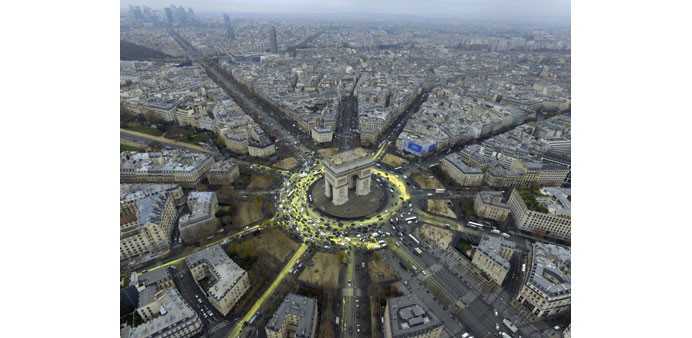Yellow paint, symbolising the sun and its rays, is seen around the Arc de Triomphe during a protest on Champs Elysees avenue on the sidelines of the World Climate Change Conference 2015 (COP21), in Paris, in this handout photo taken and distributed yesterday by Greenpeace.
AFP
Le Bourget
World powers led a frenetic final push yesterday to seal a UN accord aimed at averting catastrophic climate change, as sleep-deprived envoys battled in Paris over trillion-dollar disputes blocking a deal.
The 195-nation conference in Paris had been scheduled to wrap up yesterday, delivering a historic agreement that would brake global warming and ease its impacts.
But weary negotiators braced themselves for a third straight round of all-night haggling after ministers wrestled with a myriad of deal-busting rows.
French Foreign Minister Laurent Fabius said he would submit a proposed final agreement this morning, and declared he was “sure” of success.
“We are almost at the end of the road and I am optimistic,” said Fabius, who is presiding over the talks that began nearly a fortnight ago with a record summit of more than 150 world leaders.
Many leaders billed the talks as the last chance to avert disastrous climate change: increasingly severe drought, floods and storms, as well as rising seas that would engulf islands and populated coasts.
The planned accord would seek to revolutionise the world’s energy system by cutting back or potentially eliminating coal and other fossil fuels, replacing them with renewables such as solar and wind.
The Paris talks have largely been free of the fierce arguments that have plagued previous UN climate conferences.
However, the biggest disputes over funding the climate fight, worth trillions of dollars over the decades to come, remain as potential deal-breakers in a draft accord released on Thursday night.
US Secretary of State John Kerry, who is spearheading American efforts in Paris, warned yesterday that “very difficult” issues still needed to be resolved.
Indian Environment Minister Prakash Javadekar spoke more ominously, warning success in Paris was not guaranteed and accusing developed nations of inflexibility.
Seeking to break the deadlock, US President Barack Obama and his Chinese counterpart, Xi Jinping, spoke by phone.
“They committed that their negotiating teams in Paris would continue to work closely together and with others to realise the vision of an ambitious climate agreement,” the White House said in a statement.
Obama had earlier in the week also spoken with the leaders of India and Brazil in a bid to find common ground with other major economies with giant carbon footprints.
At the sprawling venue on the northern outskirts of Paris, negotiators were feeling the effects of the marathon talks.
“We’re all tired and we become much less diplomatic,” Espen Ronneberg, 49, a finance negotiator for the Pacific island nation of Samoa. “Instead, we just go straight to the point. Some people don’t even say hello anymore, they just nod their heads.”
The quest to forge an effective worldwide pact dates back to 1992, when the UN climate arena was set up.
But the process has been dogged by labyrinthine fights over text, sparked especially by the issue of burden-sharing.
Developing nations have insisted established economic powerhouses must shoulder the lion’s share of responsibility for tackling climate change as they have emitted most of the greenhouse gases since the Industrial Revolution.
But the United States and other rich nations say emerging giants must also do more.
They argue that developing countries now account for most of today’s emissions and thus will be largely responsible for future warming.
Rich countries promised six years ago in Copenhagen to muster $100bn (€92bn) a year from 2020 to help developing nations make the energy shift and cope with the impact of global warming.
But how the pledged funds will be raised is still unclear – and developing countries are determined to secure a commitment for increasing amounts of money after 2020, when the pact would come into force.
The latest text refers to the $100bn as a floor, which the United States and other developed nations are resisting as they fear they would effectively be signing a blank cheque.
Another remaining flashpoint issue is how to compensate developing nations that will be worst hit by climate change but are least to blame for it.
Most nations submitted to the UN before the conference their voluntary plans to curb greenhouse gas emissions from 2020, a process that was widely hailed as an important platform for success.
But scientists say that, even if the cuts were fulfilled, they would still put Earth on track for warming of at least 2.7° Celsius.
Negotiators remain divided over when and how often to review national plans so that they can be “scaled up” with pledges for deeper emissions cuts.
Nations most vulnerable to climate change have also lobbied hard to limit warming to no more than 1.5° C (2.5° Fahrenheit) compared with pre-Industrial Revolution levels.
However several big polluters, such as China and India as well as oil producing-giant Saudi Arabia, prefer a ceiling of 2° C, which would allow them to burn fossil fuels for longer.

